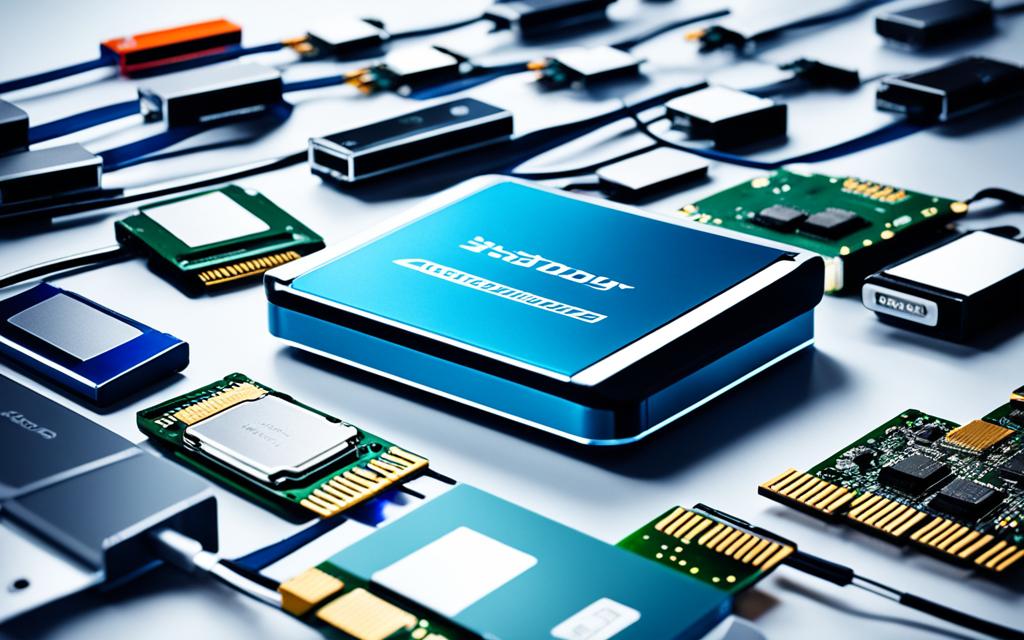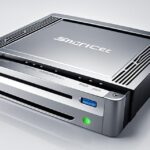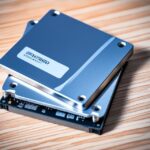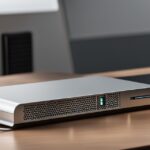Table of Contents
Nowadays, we need more space to store our digital data. USB external hard drives help with this by offering extra storage that our computer’s built-in drive can’t provide. They are great for backing up data, moving files around, and keeping lots of photos and videos. These drives can hold anywhere from 500MB to 4TB of data. Some even have more space, depending on their design1.
Most external hard drives last up to five years or more. This is good news for people who use them often1. As more people use laptops and tablets, knowing about USB HDDs is very useful. This helps them pick the best storage option. Especially when comparing them to SSDs, which work faster because they use flash memory1.
Key Takeaways
- USB HDDs provide additional storage capacity beyond internal drives.
- Typical capacities range from 500MB to 4TB with longer-lasting durability.
- Understanding various storage technologies like SSDs can enhance informed purchasing decisions.
- These devices are essential for data backup, file transfers, and multimedia needs.
- USB HDDs are critical in a world heavily reliant on mobile computing solutions.
What is USB HDD?
A USB HDD, or Universal Serial Bus Hard Disk Drive, is a must-have storage device. It connects to a computer through a USB port. It’s all about adding extra space for files, backups, and apps. This handy external memory boosts your ability to manage data easily. Getting to grips with the definition of USB HDD and its functions helps users choose the right storage solutions.
Definition and Functionality
A USB HDD is a handy tool that offers lots of storage space. It lets users organize their data well, beyond the computer’s own limits. These drives come in different sizes, perfect for big files or large media collections. You can find many types, from old-style magnetic HDDs to the latest SSDs. Each has its pros and cons like speed, durability, and price.
How USB HDDs Work
USB HDDs work by plugging into a computer’s USB port. They use special protocols to transfer data. The drives are set up with formats like FAT32, NTFS, or exFAT, each with its own rules. For example, FAT32 has a 4GB file size limit, but NTFS lets you use larger files and capacities. This flexibility shows how useful USB HDDs can be for many projects.
Types of USB HDDs Available
There are plenty of external hard drive types out there. Here are the main ones:
| Type | Key Features | Best For |
|---|---|---|
| HDD (Hard Disk Drive) | Magnetic storage, cost-effective | High-capacity storage needs |
| SSD (Solid State Drive) | No moving parts, quick speeds | Tasks needing fast performance |
| Portable HDD | Small, easy to carry | Storing data on the move |
| External SSD | Tough and light | Getting to files fast |
There’s a wide choice, helping users find a USB HDD that fits their needs. Whether it’s for daily tasks or professional work, knowing your options is crucial. For more tips on USB storage, check this detailed guide.
Today’s external drives mostly use SSDs, with sizes ranging from 256GB to several terabytes. This marks a big leap in storage tech. Both USB sticks and external drives use flash memory. This improves reliability and speed, making for a better user experience. As the world of storage devices evolves, it’s important to know about USB HDDs. Understanding types of external hard drives helps users as they explore storage options23.
Advantages of USB HDDs
USB HDDs offer many benefits to meet different storage needs, which makes them a top pick for many. They have large storage capacity, allowing you to store lots of data neatly. Consumer models can go up to 20 terabytes (TB)4. This is much more than what USB flash drives offer, perfect for keeping data safe long-term.
Storage Capacity
Their huge storage capacity is a boon for those with big media collections and large files. Compared to portable SSDs5, external hard drives give you more space for your money. This is key for anyone needing regular back-ups but wanting to keep costs down.
Cost-Effectiveness
For cost-effective storage, USB HDDs are unbeatable. They’re cheaper to make than SSDs, making them easier on the budget, especially when buying in bulk5. This lets you get more storage without breaking the bank.
Portability and Ease of Use
USB HDDs are known for being dependably portable and straightforward to use. They connect easily to USB ports for hassle-free file moving6. They’re great for adding more storage or backing up data, making managing your files a breeze.
Choosing the Right USB HDD
Finding the perfect USB HDD enhances your storage. You must look at key features that affect its efficiency, durability, and how it works with your tech.
Key Features to Consider
First off, consider how much storage capacity you need. External hard drives offer more space, ideal for backups and big files7. Speed is important too. USB 2.0 reaches up to 480Mbps, but USB 3.2 goes up to 20Gbps8.
Think about keeping your data safe with things like hardware encryption, especially for private info. It’s also essential to make sure the drive works with your operating systems to avoid compatibility issues.
Comparing USB HDDs to Other Storage Options
USB HDDs have their pros and cons compared to other storage. SSDs, like Samsung T5, offer quicker transfers but HDDs give more space for less money7. Take Western Digital’s My Passport Ultra, for instance, providing terabytes of storage for those needing a lot of space8.
USB flash drives are more compact and durable. However, they lack the space HDDs offer and can cost more for similar storage amounts7.
Use Cases for USB HDDs
USB HDDs are great for storing media, games, and backups because they are affordable and have lots of room. For heavy tasks like video editing, SSDs might be better thanks to their speed and strength. But, for storing lots of data or family photos on a budget, HDDs are a solid choice. Understanding tech’s nuts and bolts is key to unleashing tech’s full potential.
Common Issues and Troubleshooting
USB HDDs often face issues, leading to frustrations with data use and transfer. Tackling these USB problems is key for good performance and data safety. Below are the common problems and fixes for USB HDDs.
Drive Recognition Problems
One big issue is when the computer doesn’t see the USB HDD. You may not find the device in the file manager or operating system. First, check the USB connections and try different ports.
Testing the drive on another computer helps identify if the issue is with the drive or the original computer. For ongoing problems, looking into device management settings or updating drivers may be necessary.
Data Transfer Speed Concerns
Slow data transfer speeds are another worry. The speed might vary based on the file system format and the connection used. Drives with NTFS format may work differently than those with exFAT, which is good for both Windows and macOS.
Boost speed and security by avoiding Cut & Paste commands, which might cause data loss. Using drag-and-drop or backup software is better.
Suggestions for Data Security
To keep your data safe, back it up on several devices and places. This minimises loss risks. Tools like Windows File History and macOS Time Machine offer automatic backups. Having your data on different drives ensures safety and easy access when needed.
Be prepared for problems like drives showing as RAW or unallocated. Data recovery may become essential in such cases.
Knowing how to fix these USB issues can greatly improve your task with USB HDDs, leading to better data handling and trustworthiness. For deeper solutions and advice, explore more detailed online resources. Comprehensive guidance is available here.910
Conclusion
USB HDDs are key to better digital storage and efficient data handling. They are critical for both personal and professional use. They allow us to keep large files, like videos and big projects.
Knowing how USB HDDs work, their benefits, and their issues helps us choose the right storage. This technology improves how we handle data and keeps our digital world safe and flexible.
As we need more digital space, USB HDDs become very important. High-quality external storage helps us stay organised. It also prepares us for the future as we need more space111213.
FAQ
What is a USB HDD?
A USB HDD, or External Hard Drive, connects through a USB slot. It lets users add more space for their files, backups, and programs. This device makes it simple to arrange and access your data without the limits of built-in drives.
What are the advantages of using a USB HDD?
USB HDDs boast large storage, ranging from 500GB to many terabytes. They’re cost-effective and easy to carry around. They’re perfect for those with a lot of media or who need to back up important data often.
How do I choose the right USB HDD for my needs?
Think about how much storage you need, desired speed, and how tough it should be. Check if it has security features, if it works with your system, and whether you want it portable or static. Look at the USB type too, like USB 2.0 or USB 3.0.
What common issues might I encounter with my USB HDD?
You might have trouble with the computer recognising the drive. Try different USB slots or another computer to solve it. If it still won’t work, look at the device settings or update the drivers.
Are there specific features to look for in a USB HDD?
Look for good transfer speeds, secure data options, and the right USB connection. Decide if you need a portable drive or one that stays put.
How does a USB HDD compare to other storage options?
USB HDDs have more room than flash drives and are cheaper than built-in drives. They’re also more mobile than fixed storage options, making them flexible for many needs.
What steps can I take to ensure data security on my USB HDD?
To keep your data safe, use encryption software for important files, back up often, and remove the drive safely after use. Also, keep the drive in a secure place to avoid loss or damage.
Source Links
- https://www.lenovo.com/us/en/glossary/external-hard-drives/ – External Hard Drives: Your Guide to Buying an External Hard Disk
- https://www.sony.co.uk/electronics/support/articles/00148248 – What types of USB HDDs (hard disk drives) are compatible with Sony’s Android TV?
- https://www.usbmemorydirect.com/blog/external-hard-drive-vs-usb/ – External Hard Drive vs. USB Flash Drive: Which One to Pick?
- https://www.securedatarecovery.com/blog/difference-portable-and-external-hard-drives – What Is the Difference Between Portable and External Hard Drives?
- https://www.kingston.com/en/blog/pc-performance/hdd-vs-external-ssd – HDD vs External SSD- Kingston Technology
- https://www.lifewire.com/external-hard-drive-vs-flash-drive-5208546 – External Hard Drive vs. Flash Drive: What’s the Difference?
- https://www.mediaduplicationsystems.com/blog/the-ultimate-guide-external-hard-drive-vs-usb-flash-drive/ – The Ultimate Guide: External Hard Drive vs. USB Flash Drive
- https://www.digitaltrends.com/computing/how-to-buy-an-external-hard-drive/ – How to Choose an External Hard Drive | Digital Trends
- https://support-en.wd.com/app/answers/detailweb/a_id/33838/~/troubleshooting-and-tips-for-your-external-hard-drive-or-portable-ssd – Troubleshooting and Tips for Your External Hard Drive or Portable SSD
- https://www.seagate.com/support/kb/usb-external-troubleshooter-003581en/ – USB External Troubleshooter | Support Seagate US
- https://geeksonsite.com/computer-diagnostic-repair/flash-drive-vs-hard-drive-guide-to-best-storage-solution-for-you/ – External Hard Drive vs USB Flash Drive: Which is Best?
- https://en.wikipedia.org/wiki/pen_drive – USB flash drive
- https://www.partitionwizard.com/partitionmagic/external-hdd-vs-portable-hdd.html – Portable HDD vs External HDD: Compare Them and Choose One








